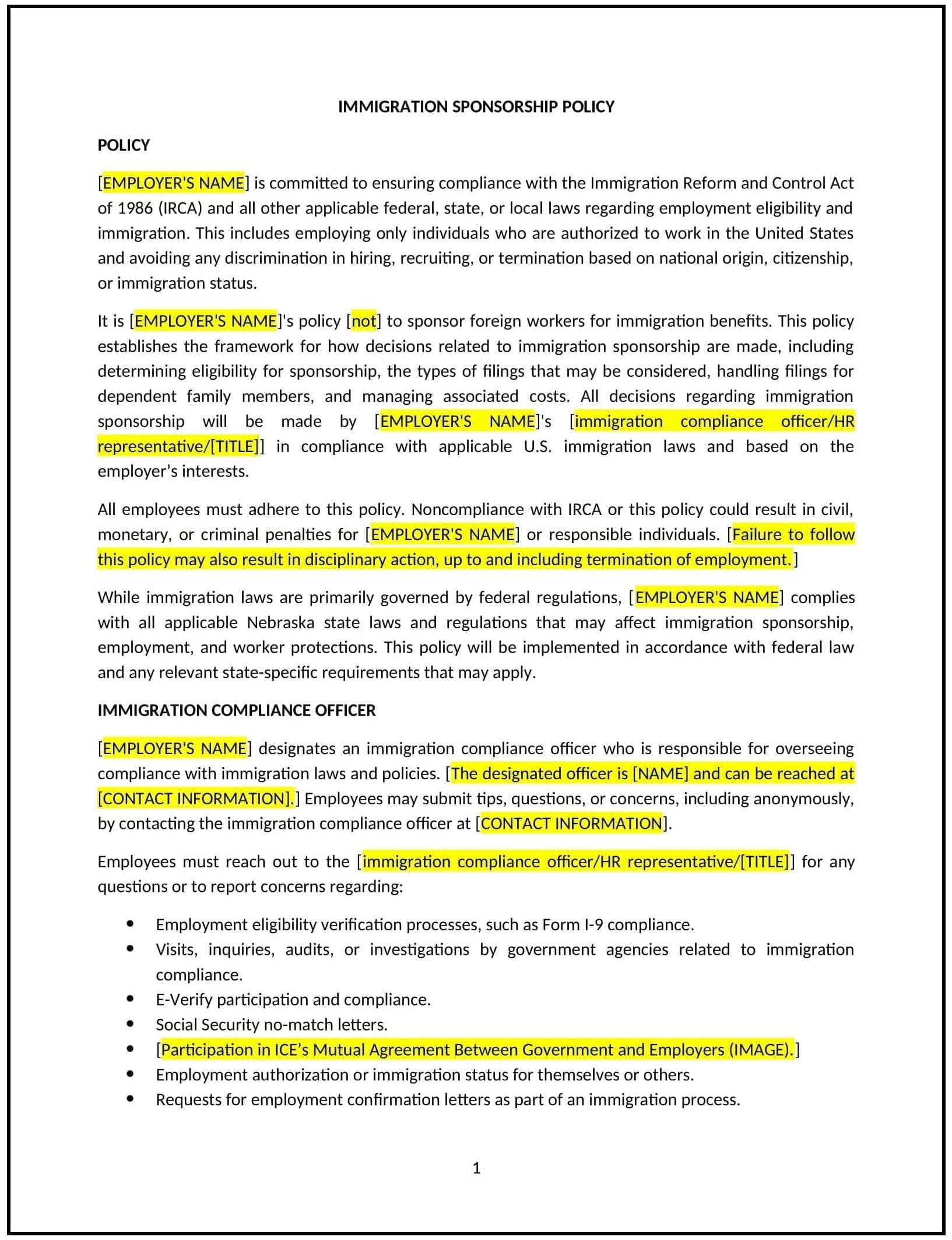Immigration sponsorship policy (Nebraska): Free template
Got contracts to review? While you're here for policies, let Cobrief make contract review effortless—start your free review now.

Customize this template for free
Immigration sponsorship policy (Nebraska)
An immigration sponsorship policy helps Nebraska businesses define their approach to sponsoring employees for work visas, permanent residency, or other immigration-related purposes. This policy outlines the company’s process for handling sponsorship requests, the types of visas the business is willing to sponsor, and the requirements for employees seeking sponsorship. It is designed to ensure that the business can attract and retain talented workers, including those from outside the U.S., while complying with immigration laws and regulations.
By adopting this policy, businesses in Nebraska can support employees who require immigration sponsorship and build a diverse and skilled workforce, while managing the complexities of immigration requirements.
How to use this immigration sponsorship policy (Nebraska)
- Define eligibility for sponsorship: Clearly outline which employees are eligible for immigration sponsorship. This may include full-time employees in specialized roles or those whose skills are in high demand. The policy should specify any requirements, such as a minimum length of employment with the company or a demonstrated need for the employee’s skills.
- Specify types of sponsorship: Identify the types of immigration sponsorship the company is willing to support, such as H-1B visas, green cards, or work permits for individuals with specialized skills. The policy should clarify whether sponsorship will be provided for temporary or permanent status.
- Outline the application process: Define the steps involved in applying for sponsorship, including how employees should initiate the process, what documentation will be required, and any deadlines or timelines associated with sponsorship applications.
- Address the company’s responsibilities: Explain the responsibilities the business has in the sponsorship process, such as filing petitions with the U.S. Citizenship and Immigration Services (USCIS), providing necessary documentation, and paying filing fees. The company should also outline any assistance it will provide to employees during the process, such as legal support or guidance on application requirements.
- Clarify employee responsibilities: Outline the employee's responsibilities in the sponsorship process, such as providing necessary documentation, maintaining lawful status during the application process, and cooperating with the company’s legal or HR teams to complete the process.
- Define costs and fees: Specify whether the business will cover any costs associated with the sponsorship process, such as filing fees or legal expenses, or if employees will be responsible for certain costs. It’s essential to be clear about the financial responsibilities involved.
- Address sponsorship limits: Specify whether the company has any limits on the number of employees it will sponsor each year or for certain roles, especially if the business has restrictions due to industry or job availability.
- Review and update: Periodically review and update the policy to reflect changes in U.S. immigration law, company practices, or business needs. The policy should remain adaptable to new immigration policies or regulations that affect the sponsorship process.
Benefits of using this immigration sponsorship policy (Nebraska)
This policy provides several benefits for Nebraska businesses:
- Attracts diverse talent: An immigration sponsorship policy helps businesses tap into a global talent pool, bringing in skilled employees who may not otherwise be able to work in the U.S.
- Enhances workforce quality: By sponsoring skilled workers, businesses can fill critical roles that may otherwise be difficult to staff, improving overall business performance and competitiveness.
- Fosters inclusivity: Offering immigration sponsorship demonstrates a commitment to diversity and inclusivity, supporting employees from different backgrounds and promoting a global workforce.
- Reduces turnover: Employees who receive sponsorship feel valued and supported by their employer, which can lead to improved loyalty and reduced turnover.
- Supports compliance: By outlining the company’s approach to immigration sponsorship, the policy ensures that the business follows immigration laws and manages the complex process effectively.
Tips for using this immigration sponsorship policy (Nebraska)
- Communicate the policy clearly: Ensure that all employees are aware of the company’s stance on immigration sponsorship and understand the criteria and process for seeking sponsorship.
- Offer legal support: Provide employees with access to immigration attorneys or legal consultants to guide them through the application process and ensure proper documentation is provided.
- Be transparent: Clearly outline any limitations or costs associated with the sponsorship process to avoid confusion or misunderstandings. Set realistic expectations about timelines and success rates.
- Support employees throughout the process: Regularly check in with employees who are going through the sponsorship process to offer support, answer questions, and ensure they are meeting any necessary deadlines.
- Keep track of sponsorships: Maintain records of all sponsored employees, the types of sponsorships provided, and their status to help with compliance and future planning.